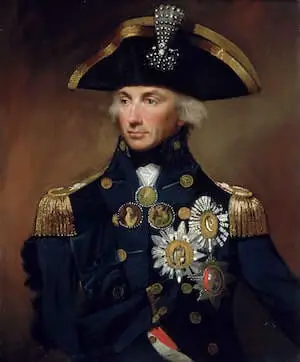To turn a blind eye is to knowingly ignore something which you know to be real and significant.
Turn a blind eye
What's the meaning of the phrase 'Turn a blind eye'?
What's the origin of the phrase 'Turn a blind eye'?
Admiral Horatio Nelson is supposed to have said this when wilfully disobeying a signal to withdraw during a naval engagement. Tales of that sort, especially when they are about national heroes like Nelson, tend to be exaggerated or entirely fictitious. That doesn’t appear to be the case here although there is evidence to show that Nelson wasn’t the first to use this phrase.
In the naval battle of Copenhagen in 1801 Nelson lead the attack of the British fleet against a joint Danish/Norwegian enemy. The British fleet of the day was commanded by Admiral Sir Hyde Parker. The two men disagreed over tactics and at one point Hyde Parker sent a signal (by the use of flags) for Nelson to disengage. Nelson was convinced he could win if he persisted and that’s when he ‘turned a blind eye’.
In their biography Life of Nelson, published just eight years later, Clarke and M’Arthur printed what they claimed to be a Nelson’s actual words at the time:
[Putting the glass to his blind eye] “You know, Foley, I have only one eye – and I have a right to be blind sometimes… I really do not see the signal.”
Sadly, Nelson didn’t use the phrase ‘turn a blind eye’ nor was he the first to allude to the meaning of the phrase.
As we know to ‘turn a blind eye’ is to wilfully fail to acknowledge one has seen something which one must have seen all too clearly. This usage was put into print by the British novelist Francis Lathom in Men and Manners, 1800:
“Lady Gab was yesterday married to General Howitzer.”
“Gracious! you don’t say so? Why, he’s the very man for whom she had, her whole life, declared the greatest aversion.”
“Why,” replied Sir Harry, “the world is ill-natured enough to say, that as her ladyship and the general were engaged in a rubber, about three weeks ago, at the Viscountess of Loo’s, the general’s glass eye, by accident, fell upon the table -“
“Glass eye!” interrupted Lady Varny.”
“I only speak from report,” returned he; “yes, a glass eye; and that her ladyship, who has an excellent taste for nic-nacories, was so charmed by its structure, that she immediately resolved on giving him her hand, for which he had long been a private suitor.”
“It is lucky for the poor man he has a blind eye to turn to her,” cried Lady Varny […]
That beats Nelson by a year.
The first recorded use of the phrase in the form we normally use it today is in More letters from Martha Wilmot: Impressions of Vienna, 1819-1829. These were reprinted in 1935 and this quotation is recorded as being sent by Ms. Wilmot in 1823:
“turn a blind eye and a deaf ear every now and then, and we get on marvellously well.”
The manner of use of the phrase in that quotation suggests that it was well understood at the time.
Nelson may not have coined ‘turn a blind eye’ but it his actions in battle that have made it into an everyday expression.
See also: Kiss me Hardy
The history of “Turn a blind eye” in printed materials
Trend of turn a blind eye in printed material over time
Related articles
Related phrases and meanings
Browse more Phrases
About the Author

Phrases & Meanings
A-Z
A B C D E F G H I J K L M N O P Q R S T UV W XYZ
Categories
American Animals Australian Bible Body Colour Conflict Death Devil Dogs Emotions Euphemism Family Fashion Food French Horses ‘Jack’ Luck Money Military Music Names Nature Nautical Numbers Politics Religion Shakespeare Stupidity Entertainment Weather Women Work
How did we do?
Have you spotted something that needs updated on this page? We review all feedback we receive to ensure that we provide the most accurate and up to date information on phrases.
